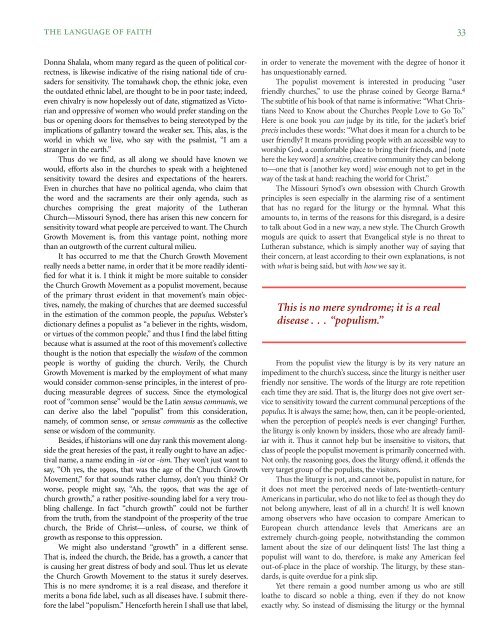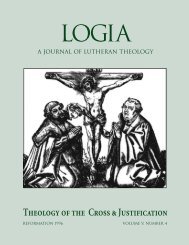04-2 Hermeneutics.pdf
04-2 Hermeneutics.pdf
04-2 Hermeneutics.pdf
- No tags were found...
You also want an ePaper? Increase the reach of your titles
YUMPU automatically turns print PDFs into web optimized ePapers that Google loves.
THE LANGUAGE OF FAITH 33Donna Shalala, whom many regard as the queen of political correctness,is likewise indicative of the rising national tide of crusadersfor sensitivity. The tomahawk chop, the ethnic joke, eventhe outdated ethnic label, are thought to be in poor taste; indeed,even chivalry is now hopelessly out of date, stigmatized as Victorianand oppressive of women who would prefer standing on thebus or opening doors for themselves to being stereotyped by theimplications of gallantry toward the weaker sex. This, alas, is theworld in which we live, who say with the psalmist, “I am astranger in the earth.”Thus do we find, as all along we should have known wewould, efforts also in the churches to speak with a heightenedsensitivity toward the desires and expectations of the hearers.Even in churches that have no political agenda, who claim thatthe word and the sacraments are their only agenda, such aschurches comprising the great majority of the LutheranChurch—Missouri Synod, there has arisen this new concern forsensitivity toward what people are perceived to want. The ChurchGrowth Movement is, from this vantage point, nothing morethan an outgrowth of the current cultural milieu.It has occurred to me that the Church Growth Movementreally needs a better name, in order that it be more readily identifiedfor what it is. I think it might be more suitable to considerthe Church Growth Movement as a populist movement, becauseof the primary thrust evident in that movement’s main objectives,namely, the making of churches that are deemed successfulin the estimation of the common people, the populus. Webster’sdictionary defines a populist as “a believer in the rights, wisdom,or virtues of the common people,” and thus I find the label fittingbecause what is assumed at the root of this movement’s collectivethought is the notion that especially the wisdom of the commonpeople is worthy of guiding the church. Verily, the ChurchGrowth Movement is marked by the employment of what manywould consider common-sense principles, in the interest of producingmeasurable degrees of success. Since the etymologicalroot of “common sense” would be the Latin sensus communis, wecan derive also the label “populist” from this consideration,namely, of common sense, or sensus communis as the collectivesense or wisdom of the community.Besides, if historians will one day rank this movement alongsidethe great heresies of the past, it really ought to have an adjectivalname, a name ending in -ist or -ism. They won’t just want tosay, “Oh yes, the 1990s, that was the age of the Church GrowthMovement,” for that sounds rather clumsy, don’t you think? Orworse, people might say, “Ah, the 1990s, that was the age ofchurch growth,” a rather positive-sounding label for a very troublingchallenge. In fact “church growth” could not be furtherfrom the truth, from the standpoint of the prosperity of the truechurch, the Bride of Christ—unless, of course, we think ofgrowth as response to this oppression.We might also understand “growth” in a different sense.That is, indeed the church, the Bride, has a growth, a cancer thatis causing her great distress of body and soul. Thus let us elevatethe Church Growth Movement to the status it surely deserves.This is no mere syndrome; it is a real disease, and therefore itmerits a bona fide label, such as all diseases have. I submit thereforethe label “populism.” Henceforth herein I shall use that label,in order to venerate the movement with the degree of honor ithas unquestionably earned.The populist movement is interested in producing “userfriendly churches,” to use the phrase coined by George Barna. 4The subtitle of his book of that name is informative: “What ChristiansNeed to Know about the Churches People Love to Go To.”Here is one book you can judge by its title, for the jacket’s briefprecis includes these words: “What does it mean for a church to beuser friendly? It means providing people with an accessible way toworship God, a comfortable place to bring their friends, and [notehere the key word] a sensitive, creative community they can belongto—one that is [another key word] wise enough not to get in theway of the task at hand: reaching the world for Christ.”The Missouri Synod’s own obsession with Church Growthprinciples is seen especially in the alarming rise of a sentimentthat has no regard for the liturgy or the hymnal. What thisamounts to, in terms of the reasons for this disregard, is a desireto talk about God in a new way, a new style. The Church Growthmoguls are quick to assert that Evangelical style is no threat toLutheran substance, which is simply another way of saying thattheir concern, at least according to their own explanations, is notwith what is being said, but with how we say it.This is no mere syndrome; it is a realdisease ...“populism.”nbFrom the populist view the liturgy is by its very nature animpediment to the church’s success, since the liturgy is neither userfriendly nor sensitive. The words of the liturgy are rote repetitioneach time they are said. That is, the liturgy does not give overt serviceto sensitivity toward the current communal perceptions of thepopulus. It is always the same; how, then, can it be people-oriented,when the perception of people’s needs is ever changing? Further,the liturgy is only known by insiders, those who are already familiarwith it. Thus it cannot help but be insensitive to visitors, thatclass of people the populist movement is primarily concerned with.Not only, the reasoning goes, does the liturgy offend, it offends thevery target group of the populists, the visitors.Thus the liturgy is not, and cannot be, populist in nature, forit does not meet the perceived needs of late-twentieth-centuryAmericans in particular, who do not like to feel as though they donot belong anywhere, least of all in a church! It is well knownamong observers who have occasion to compare American toEuropean church attendance levels that Americans are anextremely church-going people, notwithstanding the commonlament about the size of our delinquent lists! The last thing apopulist will want to do, therefore, is make any American feelout-of-place in the place of worship. The liturgy, by these standards,is quite overdue for a pink slip.Yet there remain a good number among us who are stillloathe to discard so noble a thing, even if they do not knowexactly why. So instead of dismissing the liturgy or the hymnal
















